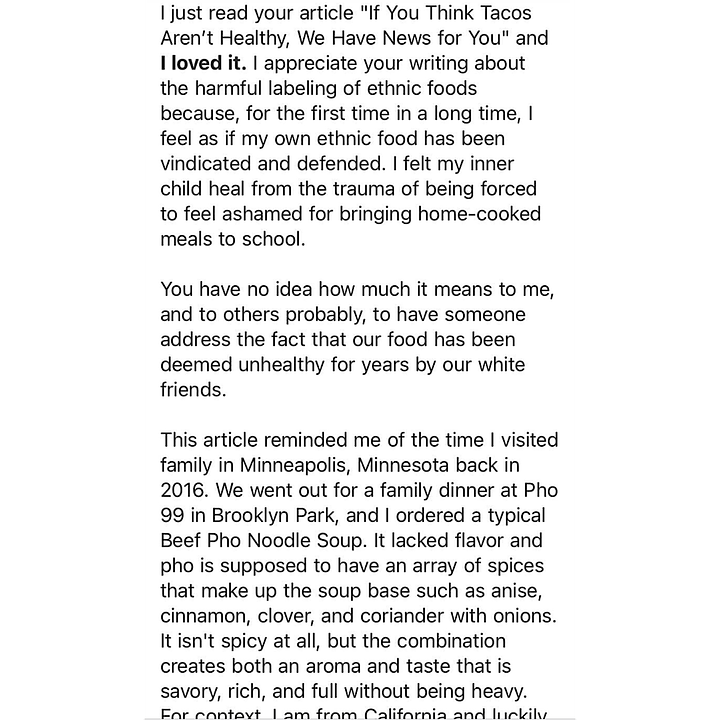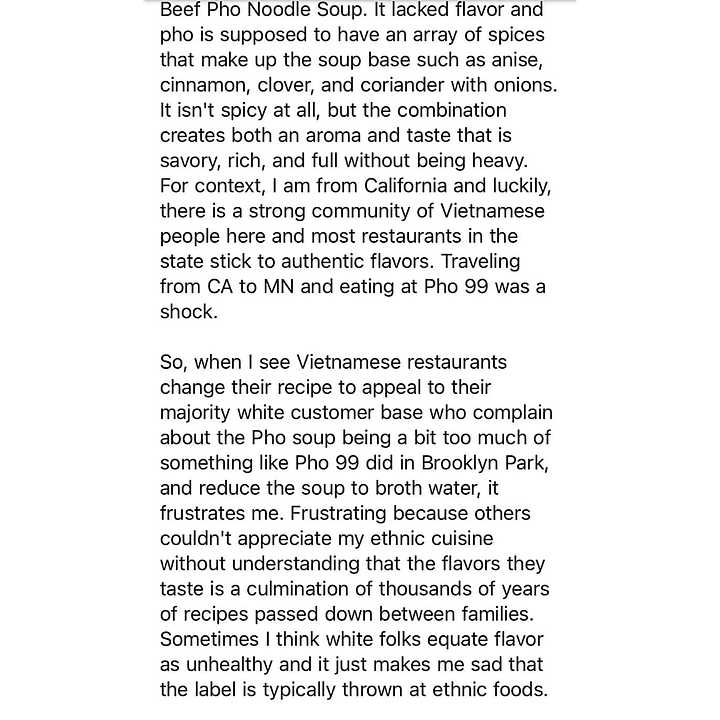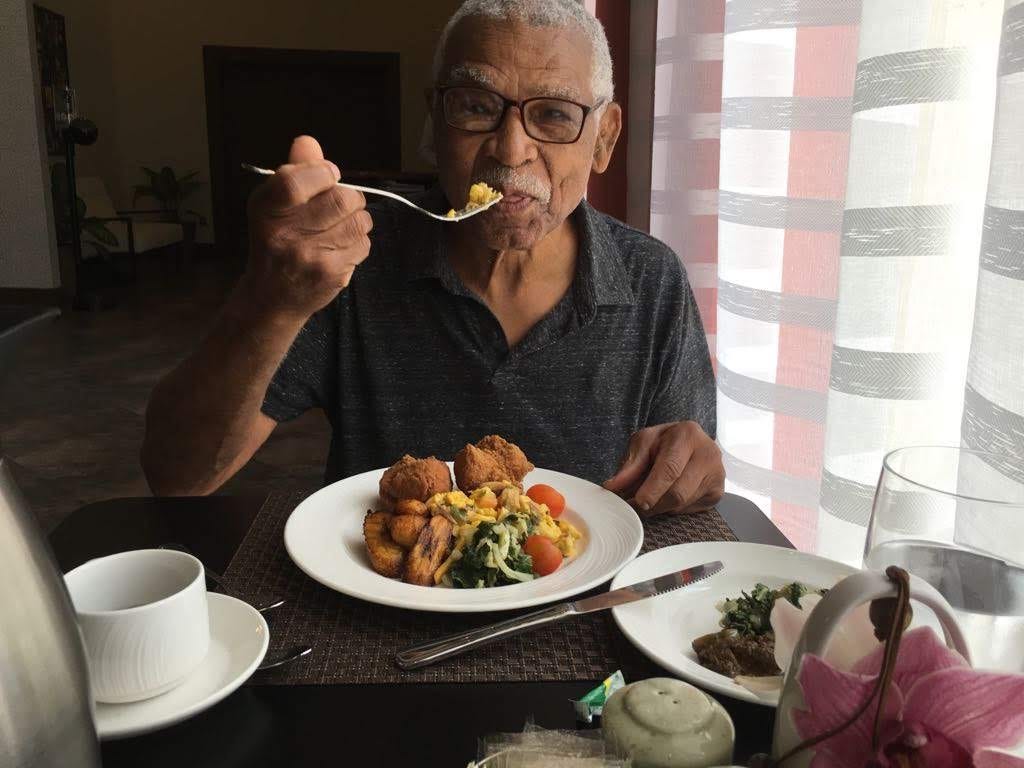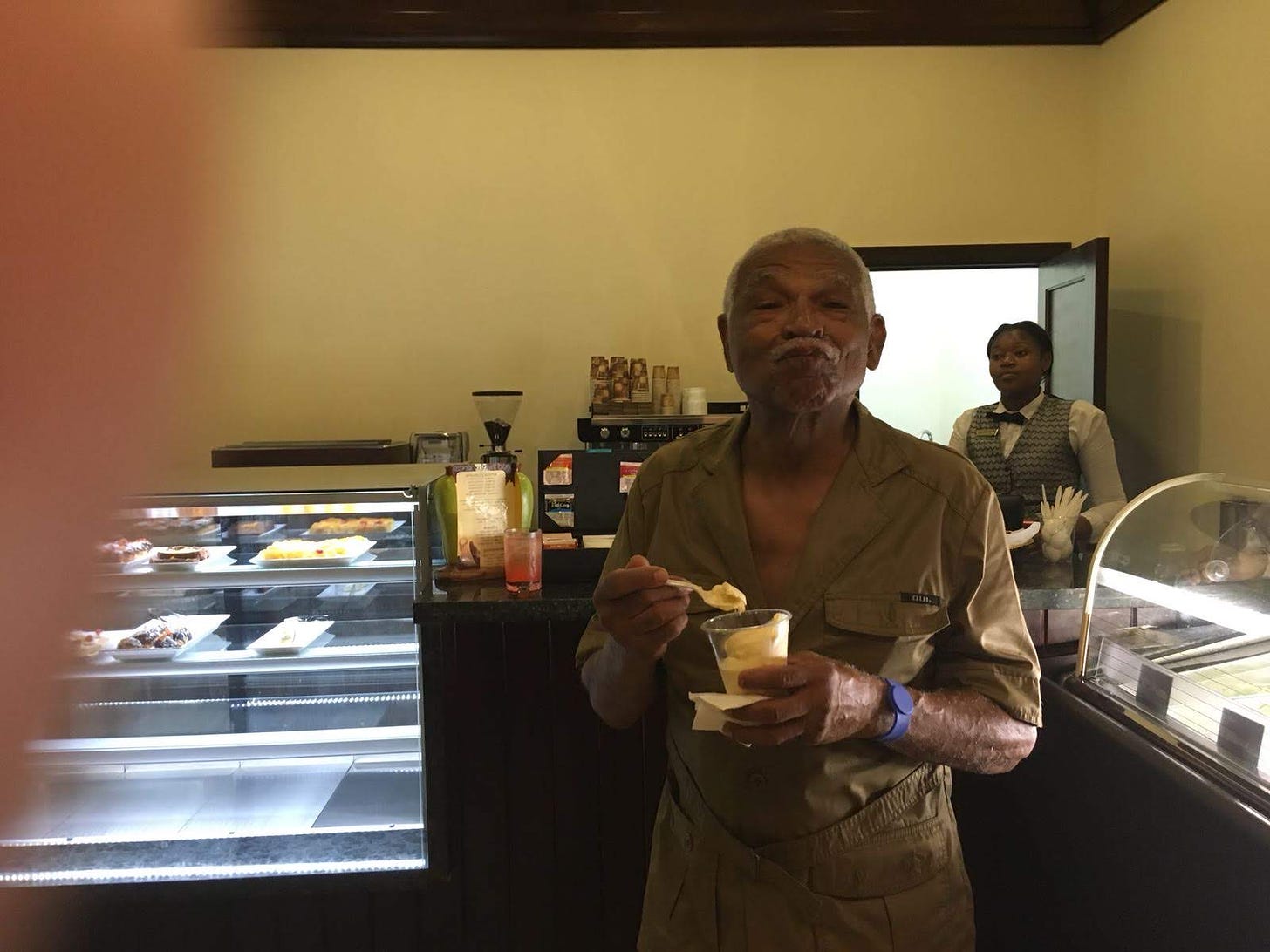Your Cultural Foods Matter
"Food contributes to an individual’s physical and mental well-being and expresses one’s cultural identity through preparation, sharing, and consumption."
Food is more than fuel. It is so bizarre to say this and get a visceral reaction from folks who make it their life mission to find out how to maximize each and every macro for key body optimization. I don’t even say this in a mocking way because of course figuring out how to eat in a way that works for us individually, is important. If you are an athlete, yes, it is important to find out how to make food work for you the best way in order to optimize your performance. Even if you aren’t Simone Biles, figuring out what works and what doesn’t, is important. However, I strongly believe we need to think beyond this and realize that food is more than its nutrients provided. Do you ever notice that whenever there is talk about the joy of food and cuisine, we discuss it in a “cheat meal” or “I’m bad for indulging” way? In other words, feeling joy with food is still thought of as inherently wrong. This is especially true around the holidays and other festivities when we are most likely spending time with our families during and many of us are eating foods that aren’t in our normal rotation. Many of these foods are also cultural and represent a heritage and also a history that is passed down generations, through meals. Food represents nutrition, culture, heritage, traditions, comfort, a social aspect and love.
I think about this on a personal level with my own family. My father and I share a love of desserts. My mother always teases that I got my sweet tooth from my father and of course she isn’t wrong. I fondly remember my father and I walking through the aisles of stores and picking out cakes, pies, or ice cream to try out. I remember us sitting together after dinner and having dessert together while watching television or a movie. It was a shared tradition, even though it sounds simple. Aside from loving dessert, my father loved to cook and unfortunately that was not a passed down tradition as I prefer making meals that require 30 minutes or less of my time. But my father was the one who loved to create in the kitchen, even my mother attests to this. Food was something important and it provided a sense of love in addition to nourishment. There were Sunday brunches of saltfish, ackee, dumplings and plantains or egg omelettes. For birthdays, there were lobster dinners and he drove to Chinatown in Manhattan to acquire the lobsters himself. He loved every minute of it and prided himself in doing these things. Food is love.
My father had a stroke in 2019 that was non dietary related and needless to say his cooking days are gone, however his love of food is not. My mother and I, without having to verbally say it, recognize that food is how we show love and say “I love you”. When we now visit him in the nursing facility, we hardly ever show up empty handed. We try to bring some form of food, fruit, dessert, or one of his favorite Jamaican meals. “We love you”, is what we are saying. We don’t have to, of course the facility has food (delicious food I might add that is rare of nursing facilities) but we do. The last thing we are thinking of is how many nutrients are in it and how it will fuel his body. We are providing a social aspect and upholding a cultural connection because that’s what food can and should do.
I recently read Ernest Owens’ “Soul Food Does Not Need Saving” in Eater, and was reminded of how we are constantly bombarded with the messaging of how we (mostly minority populations) should try to change and assimilate ourselves and our food. “I also thought changing up our foods would be good for us. Years of watching holiday cooking specials on Good Morning America and the Today show inspired me to consider healthy “hacks,” such as roasted squash instead of candied yams, creamed spinach over baked mac and cheese, and cauliflower mash in lieu of potatoes, to cut carbs. I had read so much about the health disparities in the Black community and how eating traditional soul-food dishes, typically recipes that were high in calories, sodium, and fat, led to an increased risk of stroke and death.”, Owens writes. I too, remember constantly thinking my cultural foods were unhealthy. Between my Caribbean and Southern roots, I went through the same phase as Owens years ago telling my family to change recipes, healthify them, because the food wasn’t good enough, wasn’t healthy, as I was told. I remember my dad sometimes laughing at me, sometimes even giving in (probably to make me shut up), but mostly sticking to traditions. I think about how common this is, especially within many households that have second generation United States born children. We are watching the media tell us to eat better and to fix our foods and we attempt to correct our elders in the kitchen because of it. I also want to make it clear that recipes can be modified with substitutions for personal and individual reasons of course. My mother modifies a Southern collard greens recipe for a less salt and fat version for our individual family only. Is this necessary to do as a whole for every household? No. Does that mean our version is the best? No, because the modifications are meant for us for personal reasons that don’t apply to everyone else.
I wrote about this topic myself for Outside magazine, because as a Black dietitian, I see the way our food (across the diaspora) is discussed in the media. That is why I am constantly discussing this. And this isn’t just limited to one culture of course. I received an email this summer from someone who read this article and shared how much it resonated. She made me cry. In a good way.


“You have no idea how much it means to me, and to others probably, to have someone address the fact that our food has been deemed unhealthy for years by our white friends.” Unfortunately, this statement resonated with me and I’m sure resonates with many because we have seen too often, our foods consistently being demonized by mainstream media and we buy into this messaging.
Again, there will always be room to add nutrients to cultural meals, but this doesn’t mean that the culture as a whole is “unhealthy,” or that even the dish needs to be completely altered. As a dietitian, I think there are ways to improve the nutrient density or nutrition composition of any recipe through different cooking techniques or ingredient swaps. I reiterate this because I always, and I mean always, receive snickering comments from folks, mostly white, who don’t understand this phenomenon of careful wording when we discuss a cultural food. The comments will always be along the lines of “I’m xyz culture, feel free to change my cultural foods to make it healthy.” This is funny simply because this commenter felt compelled to speak on behalf of everyone of their culture. Do they know for sure that’s how everyone feels? “This is virtue signaling.” I guess it is as opposed to maybe lacking empathy and social awareness. “It’s only problem, if you make it a problem.” Translation - we have talked about food for years any way we wish and it was never brought up before so this is actually disrupting my own comfort level.
This doesn’t represent the majority of how many think and no one demographic is a monolith. However, I have to stress that when you are of a demographic that is not used to being “othered” and not constantly told to assimilate, yes you might have difficulty understanding the significance of someone saying that cultural foods are more than okay.
There are even studies that show being able to fully partake in cultural foods (tradition wise as well as cooking and eating), demonstrates improved multiple well-being components and led to feelings of happiness, decreased stress, warmth, better digestion, and a sense of belonging, comfort, and safety. “Foodways as the juncture of food and culture, in which cultural members came together to consume traditional foods and participate in cultural practices and rituals whereby they also commemorated and strengthened their cultural ties and identity.” The quote from the subtitle of this newsletter also comes from this study and is a great reminder to us all.
There are no good foods or bad foods. There are foods that you eat for better performance, there are foods you avoid because you’re allergic, there are foods for better digestion, there are foods you avoid because of medical ailments, there are foods for better muscle repair, there are foods you avoid because you don’t enjoy them personally, and there are foods for comfort and joy. We can work to undo what we’ve been taught and realize that all foods are providing something positive in some form. Rethink feeling as though you have to modify dishes and meals just because, and think about where you have learned that you should do that from. Food is fuel. Food is love. Food is culture. Food is traditional. Food is heritage. Food is social. Food is personal. Food is food.







Your father reminds me of mine, I loved this post, precious!
Thank you! Love a foodie dad!